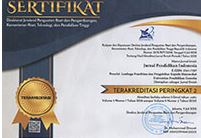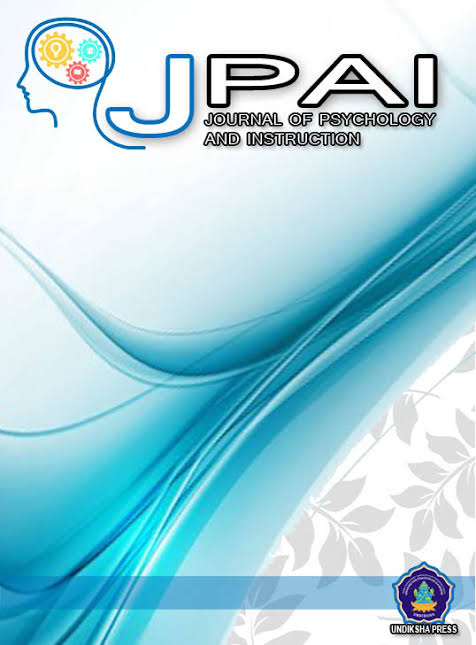WORD-SOUND THERAPY AS AN INTERVENTION TO IMPROVE PHONOLOGICAL AWARENESS: CASE STUDY ON A CHILD WITH PHONOLOGICAL DISORDER
DOI:
https://doi.org/10.23887/jpai.v2i2.15981Abstract
Phonological awareness is ability to segment the syllables and phonemes heard in speech. It is also the most important behavioral index to measure the development of reading skill. Children who had problems or impairments in phonological awareness will perform high-risk for reading skill mastery which is the most important skill in early education level. The current study aims to evaluate the effect of Word-Sound Therapy in improving phonological awareness and speech production in single word segment level. The subject of the study is a child, 5 years of age, who met the diagnostic criterias for Phonological Disorder according to Diagnostic and Statistical Manual of Mental Disorders (DSM-IV-TR). The Word-Sound Therapy is used as an intervention which include series of phonological awareness tasks and inserting the speech production training between the phonological awareness activities to improve phonemic awareness. This research is using a multiple baseline across behavior design. The qualitative data analysis was conducted using behavioral approach, Response Antecedents Consequences-Strength (RAC-S). Visual inspection was also used to observe the emergence of target behaviors. Result showed that Word-Sound Therapy is improving child’s ability in identifying similarity and analyze the last phoneme in words. Result also showed that this therapy could be used for children at minimum 5 years of age, had normal IQ, and needs a phonological awareness intervention especially focused in rhyme detection and last phoneme isolation.References
American Psychiatric Association. (2000). Diagnostic and Statistical Manual of Mental Disorders. Fourth Edition - Text Revision. Washington DC: American Psychiatric Association.
Ashby, Jane. (2010). Phonology is fundamental in skilled reading: Evidence from ERPs. Psychonomic Bulletin & Review, 17 (1), 95-100.
Blischak, D. M., Shah, S. D., Lombardino, L. J., & Chiarela, K. (2004). Effects of phonemic awareness instruction on the encoding skills of children with severe speech impairment. Disability and Rehabilitation, 26, 1295-1304.
Bowen, C. (1998). Developmental phonological disorders. Downloaded on Friday, January 22, 2010 from http://www.speech-language-therapy.com/parentinfo.html.
Byrnes, J. P. (1996). Cognitive development and learning in instructional contexts. Boston: Allyn & Bacon.
Cirrin, F. M., & Gillam, R. B. (2008). Language intervention practices for school-age children with spoken language disorders: A systematic review. Language, Speech, and Hearing Services in Schools, 39, S110-S137.
Davidson, T. (2003). Phonological disorder. Downloaded on Friday, January 22, 2010 from http://www.minddisorders.com/Ob-Ps/Phonological-disorder.html.
Ehri, L. C., & McCormick, S. (1998). Phases of word learning: Implications for instruction with delayed and disabled readers. Reading & Writing Quarterly, 14, 135-164.
Gillon, G. T. (2000). The efficacy of phonological awareness intervention for children with spoken language impairment. Language, Speech & Hearing Services in Schools, 31, 126-141.
Gillon, G. T. (2007). Phonological awareness assessment probes for preschool children. Downloaded on Thursday, March 11, 2010 from http://www.education.canterbury.ac.nz/people/gillon/resources.shtml.
Gillon, G. T. (2008). The Gillon Phonological Awareness Training Programme: An intervention programme for children at risk for reading disorder. Canterbury: Department of Communication Disorders, College of Science, University of Canterbury.
Hipfner-Boucher, Kathleen, et.al. (2014). Relationship between preschoolers’ oral language and phonological awareness. First Language, 34 (2), 178-197.
Holm, A., Farrier, F., & Dodd, B. (2008). Phonological awareness, reading accuracy and spelling ability of children with inconsistent phonological disorder. International Journal of Language & Communication Disorders, 43, 300-322.
McNeill, B. C., Gillon, G. T., & Dodd, B. (2009). Effectiveness of an integrated phonological awareness approach for children with Childhood Apraxia of Speech (CAS). Child Language Teaching and Therapy, 25, 341-366.
Nation, K., & Snowling, M. J. (2004). Beyond phonological skills: broader language skills contribute to the development of reading. Journal of Research in Reading, 27, 342-356.
Picard, C. J. (2002). Phonological awareness for the speech/language pathologists and their educational partners. Louisiana: Louisiana Department of Education.
Puspitasari, N. (2010). Laporan Praktik Kerja Profesi Bidang Psikologi Pendidikan Tingkat TK (Unpublished). Yogyakarta: UGM Faculty of Psychology.
Rvachew, S., & Grawburg, M. (2006). Correlates of phonological awareness in preschoolers with speech sound disorders. Journal of Speech, Language, and Hearing Research, 49, 74-87.
Rvachew, S. (2007). Phonological processing and reading in children with speech sound disorders. American Journal of Speech-Language Pathology, 16, 260–270.
Sessiani, L. A. (2010). Laporan Praktik Kerja Profesi Bidang Psikologi Pendidikan Tingkat TK (unpublished). Yogyakarta: UGM Faculty of Psychology.
Snowling, M. J., & Stackhouse, J. (2006). Dyslexia, speech, and language – a practitioner’s handbook – second edition. London: Whurr Publishers.
Sunanto, J., Takeuchi, K., & Nakata, H. (2005). Pengantar penelitian dengan subyek tunggal. Tsukuba: CRICED University of Tsukuba.
Sundel, M., & Sundel, S. S. (2005). Behavior change in the human services – behavioral and cognitive principles and applications. Thousand Oaks: Sage Publications.
Sutherland, D., & Gillon, G.T. (2005). Assessment of phonological representations in children with speech impairment. Language, Speech, and Hearing Services in Schools, 36, 294-307.
Tim Penyusun Kamus Pusat Pembinaan dan Pengembangan Bahasa. (1999). Kamus Besar Bahasa Indonesia. Jakarta: Balai Pustaka.
Westwood, P. S. (2001). Reading and learning difficulties: Approaches to teaching and assessment. Camberwell: Acer Press.
Wulansari, A. J. (2009). Pelatihan imitasi suara untuk anak yang mengalami gangguan fonologi. Thesis. (Unpublished). Yogyakarta: UGM Faculty of Psychology.










